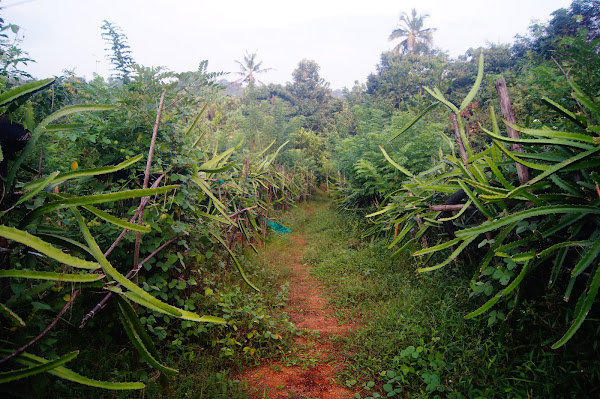Part two - Coconut Trees at Liz Pepper Gardens
Plant a Coconut Tree with Us at Liz Pepper Gardens, Kerala Forest Farm
Why Coconut Trees? //Part two
( read part one here )
Coconut trees are not just symbolic of tropical paradise; they are also ecological powerhouses. Known as the "Tree of Life," they provide a myriad of benefits, from nutritious fruit to versatile wood and fibres. At Liz Pepper Gardens, we believe in the power of these majestic trees to foster sustainability and biodiversity, making them the perfect companions for our eco-conscious endeavors.
Birthdays mark milestones in our lives, and what better way to commemorate them than by contributing to the environment? At Liz Pepper Gardens, we've created a unique tradition of planting coconut trees to celebrate birthdays. Imagine the joy of watching a coconut tree grow and thrive, just like the years that have shaped you. It's a gift that keeps on giving – not only to you but also to the planet.
Joining us in planting a coconut tree is an immersive experience that connects you with nature in a meaningful way. Picture yourself at Liz Pepper Gardens, surrounded by the rhythmic rustle of leaves, the vibrant colors of diverse flora, and the invigorating scent of fresh earth. Our expert horticulturists guide you through the process, ensuring that your coconut tree is planted with care and attention.
To make the experience truly special, Liz Pepper Gardens offers personalized planting packages for various occasions. Whether it's a birthday celebration, an anniversary, or a corporate event, we tailor the experience to suit your needs. Each package includes a certificate reminder of tree adoption, regular updates on your tree's growth, and the option to visit and nurture your tree whenever you like.
Beyond the joy of celebrating moments with a purpose, your contribution at Liz Pepper Gardens has a lasting impact on the environment. Coconut trees absorb carbon dioxide, combat climate change, and contribute to the overall well-being of our ecosystem. By planting a coconut tree, you become a guardian of nature, leaving a positive legacy for generations to come.
At Liz Pepper Gardens, we invite you to be a part of our journey towards a greener, more sustainable future. Planting a coconut tree with us is not just about growing a tree; it's about cultivating dreams, fostering sustainability, and celebrating life's moments with a profound purpose. Join us in sowing the seeds of change at Liz Pepper Gardens, where every tree planted is a step towards a more harmonious coexistence with nature.
Types of Coconut Trees
Tall Coconut Trees (Cocos nucifera)
Description: Tall coconut trees are the most common variety, characterized by their towering height, reaching up to 30 meters.
Features: They have long, straight trunks and a crown of fronds at the top.
Preferred Habitat: Tall coconut trees thrive in coastal areas and are well-suited for tropical climates.
Dwarf Coconut Trees
Description: Dwarf coconut trees are smaller in stature, typically growing to a height of 6-10 feet.
Features: They have a shorter, more compact appearance compared to tall coconut trees.
Benefits: Dwarf varieties are ideal for smaller spaces, and their shorter stature makes harvesting coconuts more accessible.
Green Malayan Coconut (Cocos nucifera 'Malayan')
Description:* This is a variety of tall coconut tree known for its green-husked coconuts.
Features: The Green Malayan Coconut is resistant to diseases and produces medium-sized coconuts.
Uses: It is prized for its sweet and refreshing water, as well as its versatile coconut meat.
King Coconut (Cocos nucifera 'Aurea')
Description: The King Coconut tree is native to Sri Lanka and is distinct for its orange-colored coconuts.
Features: It has a sweeter taste compared to the common coconut, and its water is a popular beverage in tropical regions.
Benefits: King coconuts are rich in electrolytes and are often consumed for hydration and nutrition.
Coconut Water: A natural electrolyte-rich beverage, coconut water is low in calories and high in potassium.
Coconut Meat: The flesh of the coconut is rich in healthy fats, fiber, and essential nutrients.
Coconut Oil: Extracted from coconut meat, coconut oil is used for cooking, skincare, and hair care due to its moisturizing properties.
Coconut Milk: Obtained by blending coconut meat with water, coconut milk is a popular ingredient in cooking, especially in Asian and tropical cuisines.
Coconut Timber: The trunk of the coconut tree can be used as timber for construction, known for its sustainability and resistance to pests.
Coconut Coir: The fibrous husk surrounding the coconut seed, known as coir, is used for making ropes, mats, and as a soil amendment to prevent erosion.
Coconut Farming: Coconut cultivation provides a source of income for many communities, supporting livelihoods through the production of coconut-based products.
Coconut trees offer a wealth of benefits and uses, ranging from their nutritious fruits to versatile by-products. As pillars of tropical ecosystems, these trees contribute to environmental sustainability while providing valuable resources for human consumption and economic activities. Embracing the diverse types of coconut trees and their myriad applications can lead to a more sustainable and interconnected relationship between humanity and nature
Planting coconut trees requires careful consideration of the climate, soil conditions, and proper care during the early stages of growth.











Comments
Post a Comment